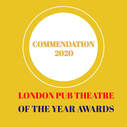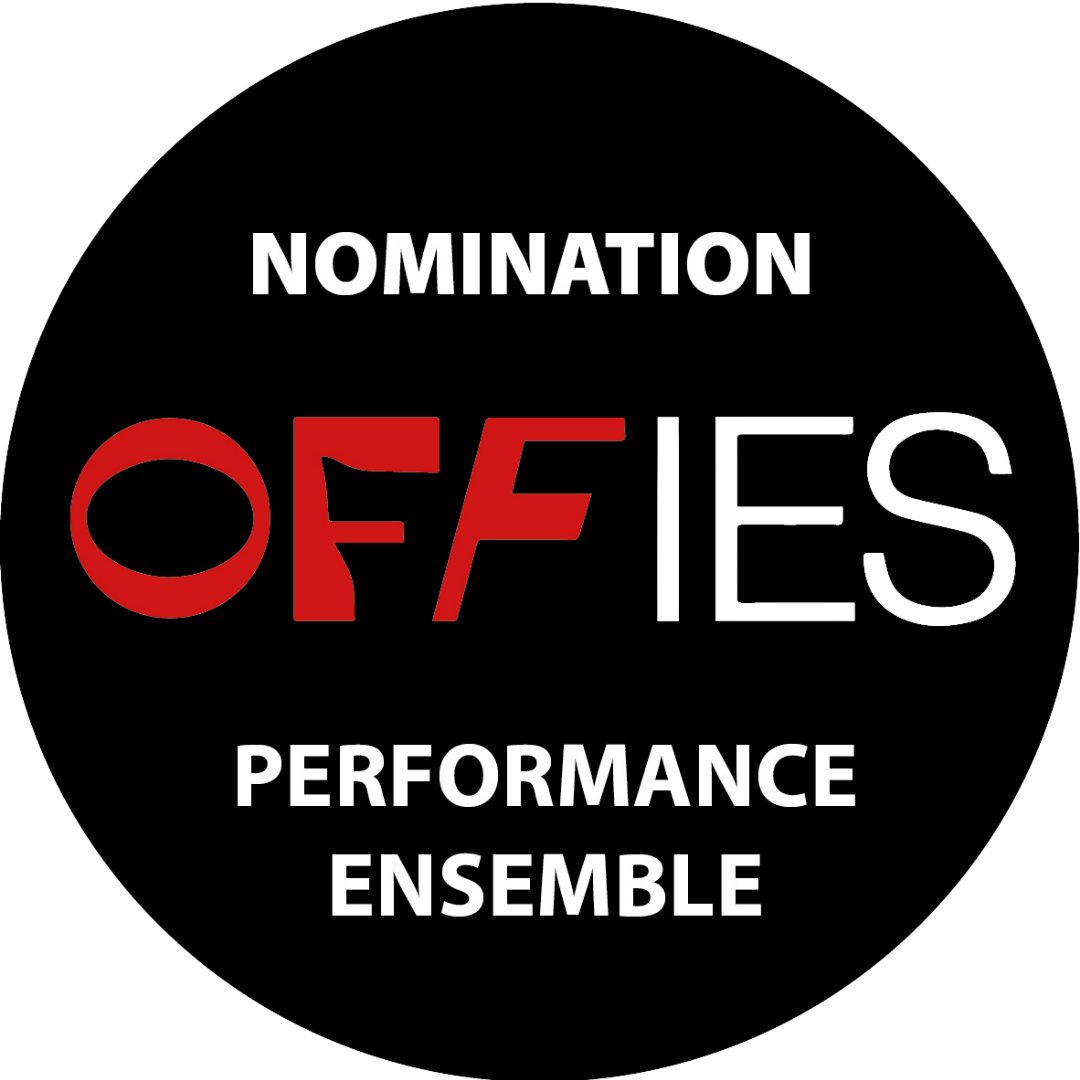
In the lead up to our London debut at The Bread & Roses Theatre, this is the place to learn all about our cast and crew, the play itself and keep up-to-date with rehearsals and preparation for the production itself (18th-22nd December).
After a run at the 2017 Edinburgh Fringe Festival, where Fringe Review made the production one of its ‘Recommended Shows’ and called it: 'A brilliant, tightly crafted piece of writing, full of belly-laughs but with an undercurrent that chills', we are bringing it to London with a brand new cast and an adapted script from the original.
Milo, Hayley and Alex go about their lives thinking they have it tough. Milo’s neighbour has died, Alex is gay and Hayley is raising a child on her own. What's worse is that no one cares. Then in walks Ruth, a woman who unquestionably has it worse, and they realise why no one cares. Unless your burden becomes your identity, you’re no one. The impact Ruth has on their lives is colossal, building inexorably towards a bitter confrontation over whose life is truly the worst.
Having brought you up to speed with the production itself, we thought we’d start our blog with the original writer-directors of The Oppression Olympics, as I interview Mark Bittlestone and Will Dalrymple a few days after our read-through (photos below):
WP: So Mark and Will, hello! So quite simply, to start off, what's the play about?
M: The play is about three individuals who believe their lives are worse than they are, and they want people to know it - Hayley: a single mother of a one year old, Alex: a gay twenty something obsessed with the idea the world is out to get him and Milo: who nothing interesting has ever happened too.
In the play's first act, these characters all meet Ruth, a bereaved mother, and are immediately bowled over by her suffering. Her son committed suicide a few years ago and no one knows why. They're curious as to how this woman can continue her daily life, they're angry that she gets more attention than they do and they all want to prove how worthy they are by offering her help that she doesn't necessarily want. As their offers of help become more and more absurd, Ruth becomes increasingly frustrated at their inability to treat her like a normal person and lashes out in return, which leads to a festive showdown at the finale of the show.
WD: The play is really focusing on the relativity of suffering, sentimentality and that millennial obsession with indulging in self-pity. And in The Oppression Olympics exploring these themes leads to humorous and slightly pathetic interactions between characters as they genuinely seek to find 'who has the worst life?'
WP:Where did the idea come from?
M: Well, the title of the play comes from a phrase used in identity politics about people who try to put their oppression on a pedestal, which we thought was apt for a play where characters try to place their suffering above others.
WD: I met a lot of people at university who were obsessed with telling people how bad their lives. Everyone says that we use social media to promote the best aspects of ourselves but I find that a lot of people use it to boast about how bad their lives are, and claim some kind of currency from that. So, we wanted to take a bit of a humorous side-swipe at that kind of indulgence.
WP: You previously had the production run at the Edinburgh Fringe Festival earlier this year, how was that experience?
WD: Very good although our late time slot made it difficult to shift tickets as we were competing with the bulk of the prime-time comedy offerings. But it was great to see the play performed by some brilliant actors and we got a wonderful review from Fringe Review out of it. If anything, the run there only gave us the confidence to take it further and make it say more.
M: Where the version in Edinburgh was caught between farce on the one hand and drama on the other, the version coming to the Bread & Roses downplays the outright attempts at humour from the characters and focuses more clearly on their stories and their lives. I think what we have now, really excitingly, is a richer and more engaging play, and I we can't wait to see it performed.
WP: How have rehearsals been going actually?
M: It's been brilliant to hand over the direction of the show this time round to the wonderful Millie Foy, who's kept us up to date with it all, and from the rehearsals we've seen the cast have really quickly picked up on the tensions in the play but have also been able to find the humour in each of their characters - which is exactly what the three of us and Millie wanted to do.
WP: What are you looking forward to most about the production?
M: As we're not directing this run, it'll be great to sit in the audience on opening night and see how the new cast take on the show and each of their characters in a different way to what we have seen before.
WD: Yeah, absolutely, and it's something of a passion project for us too. We've spent a lot of time writing and editing different versions of this play over the last year, and to be able to stage another iteration of it is a real treat for us. We just can't wait to what audiences think of it, especially now that it's got its festive flavour!
The Oppression Olympics runs 18-22 December at 7pm.
Post by Will Penswick
StraightUp Productions
[email protected]
After a run at the 2017 Edinburgh Fringe Festival, where Fringe Review made the production one of its ‘Recommended Shows’ and called it: 'A brilliant, tightly crafted piece of writing, full of belly-laughs but with an undercurrent that chills', we are bringing it to London with a brand new cast and an adapted script from the original.
Milo, Hayley and Alex go about their lives thinking they have it tough. Milo’s neighbour has died, Alex is gay and Hayley is raising a child on her own. What's worse is that no one cares. Then in walks Ruth, a woman who unquestionably has it worse, and they realise why no one cares. Unless your burden becomes your identity, you’re no one. The impact Ruth has on their lives is colossal, building inexorably towards a bitter confrontation over whose life is truly the worst.
Having brought you up to speed with the production itself, we thought we’d start our blog with the original writer-directors of The Oppression Olympics, as I interview Mark Bittlestone and Will Dalrymple a few days after our read-through (photos below):
WP: So Mark and Will, hello! So quite simply, to start off, what's the play about?
M: The play is about three individuals who believe their lives are worse than they are, and they want people to know it - Hayley: a single mother of a one year old, Alex: a gay twenty something obsessed with the idea the world is out to get him and Milo: who nothing interesting has ever happened too.
In the play's first act, these characters all meet Ruth, a bereaved mother, and are immediately bowled over by her suffering. Her son committed suicide a few years ago and no one knows why. They're curious as to how this woman can continue her daily life, they're angry that she gets more attention than they do and they all want to prove how worthy they are by offering her help that she doesn't necessarily want. As their offers of help become more and more absurd, Ruth becomes increasingly frustrated at their inability to treat her like a normal person and lashes out in return, which leads to a festive showdown at the finale of the show.
WD: The play is really focusing on the relativity of suffering, sentimentality and that millennial obsession with indulging in self-pity. And in The Oppression Olympics exploring these themes leads to humorous and slightly pathetic interactions between characters as they genuinely seek to find 'who has the worst life?'
WP:Where did the idea come from?
M: Well, the title of the play comes from a phrase used in identity politics about people who try to put their oppression on a pedestal, which we thought was apt for a play where characters try to place their suffering above others.
WD: I met a lot of people at university who were obsessed with telling people how bad their lives. Everyone says that we use social media to promote the best aspects of ourselves but I find that a lot of people use it to boast about how bad their lives are, and claim some kind of currency from that. So, we wanted to take a bit of a humorous side-swipe at that kind of indulgence.
WP: You previously had the production run at the Edinburgh Fringe Festival earlier this year, how was that experience?
WD: Very good although our late time slot made it difficult to shift tickets as we were competing with the bulk of the prime-time comedy offerings. But it was great to see the play performed by some brilliant actors and we got a wonderful review from Fringe Review out of it. If anything, the run there only gave us the confidence to take it further and make it say more.
M: Where the version in Edinburgh was caught between farce on the one hand and drama on the other, the version coming to the Bread & Roses downplays the outright attempts at humour from the characters and focuses more clearly on their stories and their lives. I think what we have now, really excitingly, is a richer and more engaging play, and I we can't wait to see it performed.
WP: How have rehearsals been going actually?
M: It's been brilliant to hand over the direction of the show this time round to the wonderful Millie Foy, who's kept us up to date with it all, and from the rehearsals we've seen the cast have really quickly picked up on the tensions in the play but have also been able to find the humour in each of their characters - which is exactly what the three of us and Millie wanted to do.
WP: What are you looking forward to most about the production?
M: As we're not directing this run, it'll be great to sit in the audience on opening night and see how the new cast take on the show and each of their characters in a different way to what we have seen before.
WD: Yeah, absolutely, and it's something of a passion project for us too. We've spent a lot of time writing and editing different versions of this play over the last year, and to be able to stage another iteration of it is a real treat for us. We just can't wait to what audiences think of it, especially now that it's got its festive flavour!
The Oppression Olympics runs 18-22 December at 7pm.
Post by Will Penswick
StraightUp Productions
[email protected]

 RSS Feed
RSS Feed













